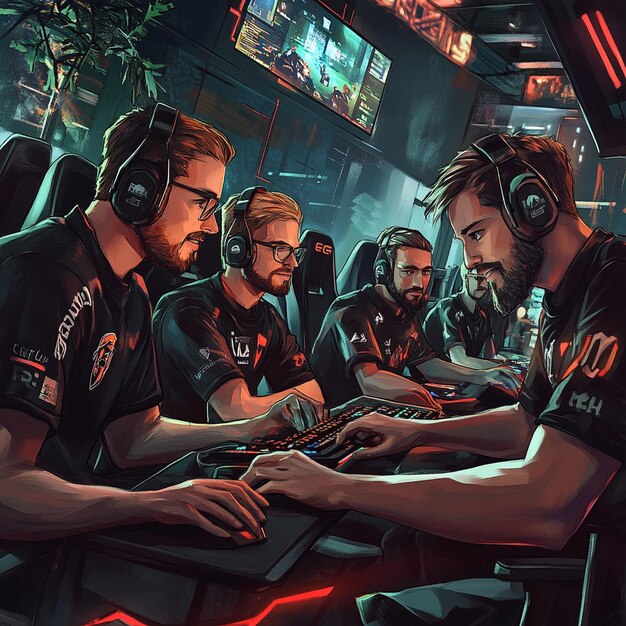Esports Revenue Diversification: 7 Ways US Teams Can Thrive

Esports revenue diversification is crucial for US teams, moving beyond sponsorships to include innovative strategies like content creation, merchandise, premium fan experiences, esports education, brand licensing, data analytics, and B2B services to ensure long-term financial stability and growth in the competitive esports market.
The esports industry is dynamic, presenting both immense opportunities and significant challenges for US teams. While sponsorships remain a primary source of income, relying solely on them can be precarious. Esports revenue diversification: 7 ways US teams can generate income beyond sponsorships is vital for ensuring long-term sustainability and growth in this competitive landscape.
Esports Teams: The Sponsorship Dependency
Esports teams in the US have traditionally leaned heavily on sponsorships to fund their operations. While these partnerships provide essential capital, they often come with limitations and uncertainties. Understanding the risks associated with over-reliance on sponsorships is the first step toward exploring alternative revenue streams.
The Risks of Sponsorship Dependence
Sponsorship agreements are typically short-term, ranging from a few months to a year or two. This necessitates constant efforts to renew contracts or find new sponsors, diverting resources from team development and competition.
Why Diversification Matters
Diversifying revenue streams creates a more stable financial foundation for esports teams. It reduces vulnerability to market fluctuations and sponsorship changes, allowing teams to invest in long-term growth and innovation.
- Financial Stability: Reduces reliance on sporadic sponsorship deals.
- Long-Term Growth: Allows for investments in infrastructure and talent.
- Innovation: Provides resources for exploring new opportunities.
Ultimately, diversifying revenue streams is about building a resilient and sustainable business model for esports teams in the US, ensuring they can thrive in an ever-evolving industry.

Content Creation: Engage Your Audience
Content creation offers esports teams a direct way to engage with their audience and build a valuable brand. Teams can leverage platforms like YouTube, Twitch, and social media to deliver unique and compelling content that resonates with fans.
Building a Content Strategy
A successful content strategy should align with the team’s brand and values. It should also cater to the interests of the target audience, providing value and entertainment.
Monetizing Content
Monetization options for content include advertising revenue, sponsorships, merchandise sales, and premium content subscriptions. Teams can also partner with brands to create sponsored content that integrates seamlessly with their existing content.
- YouTube Ads: Generate revenue through video advertising.
- Twitch Subscriptions: Offer exclusive content for subscribers.
- Merchandise Integration: Promote team merchandise within content.
By creating high-quality content, esports teams can build a loyal fanbase, attract sponsors, and generate significant revenue streams that complement traditional sponsorship agreements.
Merchandise: A Tangible Connection
Merchandise provides esports teams with a tangible way to connect with their fans and create a sense of community. From jerseys and apparel to accessories and collectibles, merchandise can be a significant revenue generator.
Designing and Sourcing Merchandise
Effective merchandise design should reflect the team’s brand and appeal to its fanbase. Teams should also consider sourcing high-quality materials and production processes to ensure customer satisfaction.
Marketing and Sales Strategies
Marketing strategies for merchandise can include online stores, social media promotions, pop-up shops at events, and partnerships with retailers. Sales strategies can incorporate discounts, bundles, and limited-edition items to drive demand.
- Online Store: 24/7 availability for fans to purchase merchandise.
- Social Media Promotion: Engage fans through targeted advertising.
- Event Sales: Offer exclusive items at esports events.
A well-executed merchandise strategy not only generates revenue but also enhances brand visibility and strengthens the bond between esports teams and their supporters.
Premium Fan Experiences: VIP Treatment
Offering premium fan experiences can create unique revenue opportunities for esports teams. These experiences provide fans with exclusive access, personalized interactions, and behind-the-scenes content that enhances their connection with the team.
Types of Premium Experiences
Premium fan experiences can include VIP meet-and-greets with players, exclusive training sessions, personalized merchandise, and access to team events.
Pricing and Packaging Strategies
Pricing should reflect the value proposition of the experience, considering factors like exclusivity, access, and duration. Packaging strategies can include tiered options, bundling with merchandise, and seasonal promotions.
- VIP Meet-and-Greets: Exclusive interactions with team members.
- Training Session Access: Behind-the-scenes look at team preparation.
- Personalized Merchandise: Unique items tailored to individual fans.
By crafting unforgettable fan experiences, esports teams can cultivate stronger relationships with their fanbase and unlock new revenue streams that go beyond traditional sponsorships.

Esports Education: Invest in Learning
Esports education is an emerging field that offers teams the opportunity to leverage their expertise and passion for gaming. By creating educational programs, workshops, and camps, teams can generate revenue while contributing to the growth of the esports ecosystem.
Developing Educational Programs
Educational programs can focus on various aspects of esports, including game strategy, team communication, physical and mental conditioning, and career development. Content should be tailored to different skill levels and age groups.
Marketing and Enrollment
Marketing strategies for educational programs can include online advertising, partnerships with schools and community organizations, and testimonials from successful graduates. Enrollment strategies can offer early-bird discounts, scholarships, and payment plans.
- Online Courses: Accessible and convenient learning options.
- Workshops and Camps: Hands-on training and skill development.
- Partnerships with Schools: Integration into academic curricula.
Esports teams can establish themselves as leaders in esports education by providing high-quality training and resources. This generates revenue and helps nurture future talent.
Brand Licensing: Expanding the Brand
Brand licensing enables esports teams to extend their brand into new product categories and markets. By licensing their logos, artwork, and team name, teams can generate passive income while increasing brand awareness.
Licensing Agreements
Licensing agreements should outline the scope of the license, the types of products allowed, the royalty rates, and the quality control standards. Legal counsel should be consulted to ensure that all agreements are comprehensive and enforceable.
Product Categories for Licensing
Potential product categories for licensing include gaming peripherals, apparel, collectibles, energy drinks, and accessories. Teams should choose categories that align with their brand values and target audience.
- Gaming Peripherals: Branded headsets, keyboards, and mice.
- Apparel: Clothing and accessories featuring team logos.
- Collectibles: Limited-edition figures and memorabilia.
Through strategic brand licensing, esports teams can generate significant revenue streams with minimal effort, while simultaneously expanding their brand presence and reaching new audiences.
Data Analytics: Leveraging Player Data
In the modern esports landscape, data analytics is increasingly valuable. Teams gather extensive data on player performance, strategy effectiveness, and fan engagement. By leveraging this data, teams can make informed decisions to improve performance, attract sponsors, and enhance fan experiences.
Data Collection and Analysis
Data can be collected from various sources, including in-game statistics, social media interactions, website analytics, and surveys. Statistical analysis, machine learning, and data visualization techniques can identify patterns and insights.
Applications of Data Analytics
Data analytics can be used to optimize player training, refine team strategies, personalize fan experiences, and target marketing campaigns. It also provides valuable insights for sponsors, demonstrating the effectiveness of their partnerships.
- Player Performance Analysis: Identifying strengths and weaknesses.
- Team Strategy Optimization: Refining strategies based on data.
- Fan Engagement Enhancement: Personalizing content and experiences.
By harnessing the power of data analytics, esports teams can gain a competitive edge on and off the field, driving innovation and maximizing revenue potential.
B2B (Business-to-Business) Services: Industry Expertise
Esports teams can leverage their expertise to offer B2B services to other organizations in the esports ecosystem. These services can include consulting, event management, talent scouting, and marketing support.
Types of B2B Services
Consulting services can help businesses understand the esports landscape, develop esports strategies, and navigate regulatory issues. Event management services can assist in planning and executing esports tournaments and events. Talent scouting services can connect organizations with skilled players and coaches. Marketing support services can promote esports products, services, and events.
Targeting B2B Clients
Potential B2B clients include brands looking to enter the esports market, schools establishing esports programs, event organizers hosting tournaments, and technology companies developing esports platforms. Teams should tailor their services to the specific needs of each client.
- Consulting: Providing strategic guidance on esports initiatives.
- Event Management: Organizing and executing esports events.
- Talent Scouting: Connecting organizations with top talent.
Offering B2B services enables esports teams to diversify their revenue streams, leverage their expertise, and contribute to the growth of the wider esports ecosystem.
| Key Areas | Brief Description |
|---|---|
| 📺 Content Creation | Engage fans with videos and live streams. |
| 👕 Merchandise | Sell branded items to build team affinity. |
| 🎓 Esports Education | Teach esports skills through courses. |
| 📊 Data Analytics | Use data to improve strategies and attract sponsors. |
FAQ
▼
Diversification reduces reliance on sponsorships, providing financial stability and enabling long-term investments in team development. By not putting all eggs in one basket, teams have a greater chance of surviving economic downturns.
▼
Teams can monetize content on platforms like YouTube and Twitch through ads, subscriptions, and sponsorships. By creating valuable and engaging content, teams can build a loyal fanbase that supports them financially.
▼
VIP meet-and-greets, exclusive training sessions, personalized merchandise, and access to team events are examples. These experiences enhance fan engagement and create unique revenue streams beyond traditional sponsorships.
▼
Data analytics helps in optimizing player training, refining team strategies, and personalizing fan experiences. Analyzing in-game statistics and social media interactions can reveal crucial insights for better decision-making.
▼
Teams can offer consulting, event management, talent scouting, and marketing support services. These services leverage their esports expertise to assist other organizations in the industry, generating additional revenue.
Conclusion
In conclusion, esports teams need to look beyond traditional sponsorships to achieve sustainable financial success. By embracing content creation, merchandise, premium fan experiences, esports education, brand licensing, data analytics, and B2B services, teams can diversify their revenue streams and build a strong foundation for long-term growth.





